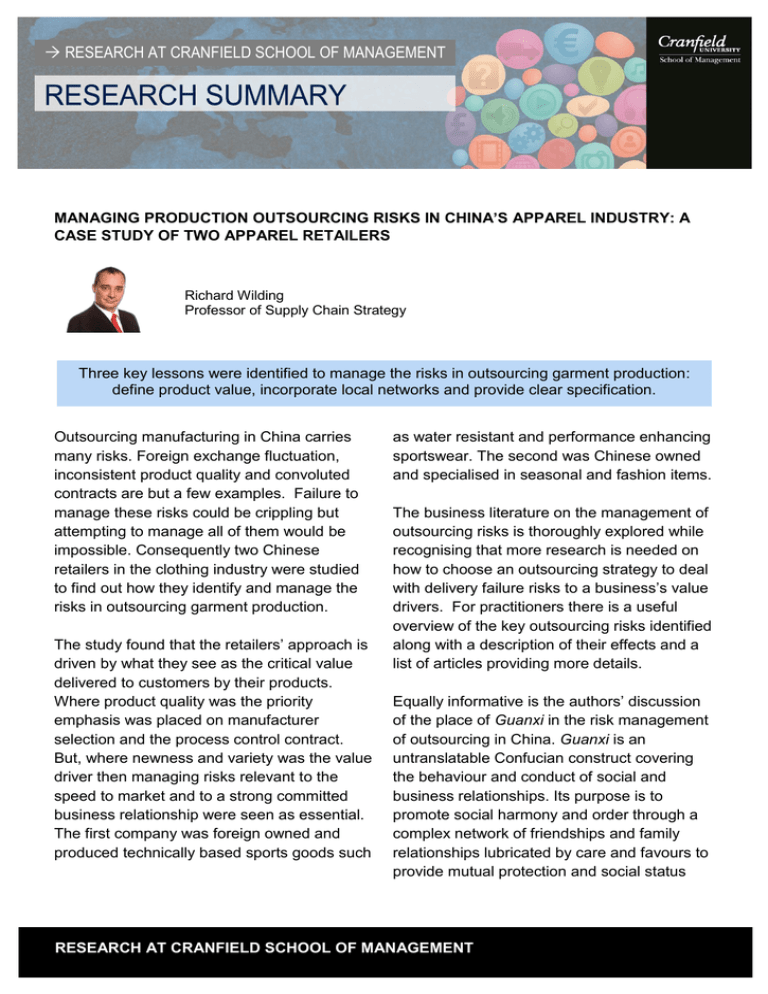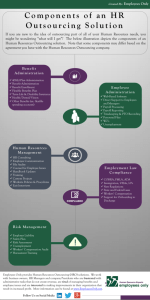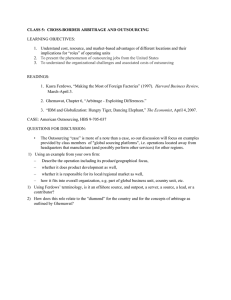RESEARCH AT CRANFIELD SCHOOL OF MANAGEMENT
advertisement

RESEARCH AT CRANFIELD SCHOOL OF MANAGEMENT MANAGING PRODUCTION OUTSOURCING RISKS IN CHINA’S APPAREL INDUSTRY: A CASE STUDY OF TWO APPAREL RETAILERS Richard Wilding Professor of Supply Chain Strategy Three key lessons were identified to manage the risks in outsourcing garment production: define product value, incorporate local networks and provide clear specification. Outsourcing manufacturing in China carries many risks. Foreign exchange fluctuation, inconsistent product quality and convoluted contracts are but a few examples. Failure to manage these risks could be crippling but attempting to manage all of them would be impossible. Consequently two Chinese retailers in the clothing industry were studied to find out how they identify and manage the risks in outsourcing garment production. The study found that the retailers’ approach is driven by what they see as the critical value delivered to customers by their products. Where product quality was the priority emphasis was placed on manufacturer selection and the process control contract. But, where newness and variety was the value driver then managing risks relevant to the speed to market and to a strong committed business relationship were seen as essential. The first company was foreign owned and produced technically based sports goods such as water resistant and performance enhancing sportswear. The second was Chinese owned and specialised in seasonal and fashion items. The business literature on the management of outsourcing risks is thoroughly explored while recognising that more research is needed on how to choose an outsourcing strategy to deal with delivery failure risks to a business’s value drivers. For practitioners there is a useful overview of the key outsourcing risks identified along with a description of their effects and a list of articles providing more details. Equally informative is the authors’ discussion of the place of Guanxi in the risk management of outsourcing in China. Guanxi is an untranslatable Confucian construct covering the behaviour and conduct of social and business relationships. Its purpose is to promote social harmony and order through a complex network of friendships and family relationships lubricated by care and favours to provide mutual protection and social status RESEARCH AT CRANFIELD SCHOOL OF MANAGEMENT enhancement. It is contrasted to western style business relationships that have explicit expectations guided by legality and rules. Consequently Guanxi can play a valuable relationship nurturing role between a firm and its outsourcing agents. In planning their case study the authors took account of the influence of Guanxi on the choice of strategies to manage outsourcing risks. The impact of Guanxi is illustrated by a noticeable difference in the companies’ risk management strategies. The sports goods manufacturer adopted formal contract management to ensure technical specifications were met. The fashion producer, however, benefitted from the softer and less rigid Guanxi approach to secure the cooperation and support of outsourced partners in getting goods to market quickly. There are three lessons for practitioners from this research: (1) Have a well-defined product value and use this to drive the management of outsourcing requirements and relationships. (2) Incorporate and acknowledge the benefits and opportunities of local networks and relationships as manifested by Guanxi in constructing outsourcing relationships especially if speed to market is the key value driver, the technical requirements are low and the order quantity is smaller scale. (3) Stringent technical production requirements need to be carefully spelt out and cannot rely on informal networks such as Guanxi. The scarcity of the right technical resources in China would make replacement difficult so clear specification at the outset is essential. Bear in mind though that these lessons emerge from just two cases. A larger scale study would provide more insight into strategies for the risk management of outsourcing in China and the influence of Guanxi. Kam, B., Chen, L. & Wilding, R. (2011) Managing production outsourcing risks in China’s apparel industry: a case study of two apparel retailers, Supply Chain Management: An International Journal, vol. 6, no. 6, pp. 428-445. For further details on this research paper please contact: richard.wilding@cranfield.ac.uk WATCH THE VIDEO INTERVIEW http://tinyurl.com/bwwdlwd Management Theme: Supply Chain and Logistics Management MANAGEMENT THEMES AT CRANFIELD SCHOOL OF MANAGEMENT Business Economics and Finance Business Performance Management Corporate Responsibility and Sustainability Entrepreneurship and Business Growth General Management Information Systems Innovation and Operations Management Leadership Managing People and Global Careers Marketing, Sales and Client Relationships Programme and Project Management Strategy, Complexity and Change Management Supply Chain and Logistics Management





